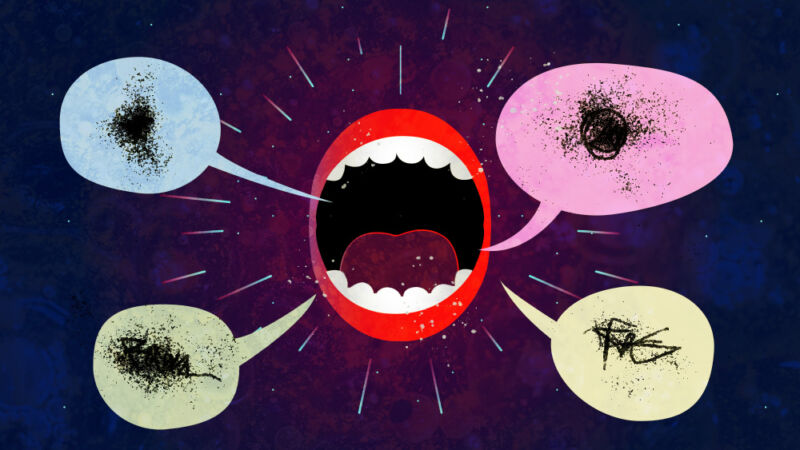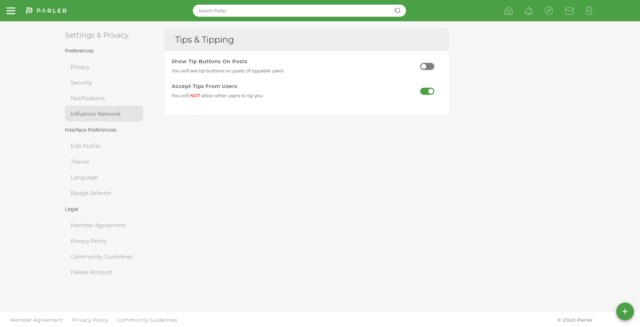What is Parler, and why is everyone suddenly talking about it?

Hundreds of millions of Americans—and our counterparts worldwide—watched the US election and its high-drama aftermath unfold on social media over the past week or so. Most of us were using Facebook or Twitter, but in the immediate wake of Election Day, a new social media platform suddenly rocketed to the top of the app download charts: Parler.
Conservative politicians, such as Sen. Ted Cruz (R-Texas) and Rep. Devin Nunes (R-Calif.), have been evangelizing Parler to their followers for more than a year and have been joined by right-wing media personalities. Conservatives have now redoubled their efforts to evade “censorship,” as Twitter works overtime to fact-check false claims about the election.
What is Parler?
Parler is a Twitter-style social media platform that first launched in 2018. As with Twitter, it’s built around a newsfeed of accounts you can choose to follow, and users can upload images in addition to creating posts of up to 1,000 characters (Twitter caps posts at 280). In addition to being available by Web, Parler has both iOS and Android apps available.
The service takes its name from the French verb parler, meaning “to speak” (or sometimes, “to talk”) as in the examples “Parlez-vous français?” or “Je veux parler avec ton gérant.” However, the app does not take the French pronunciation of the word—par-lay—and is instead pronounced “parlor,” as in a sitting room where you greet your 19th-century visitors. Posts and messages made on the platform are called “parleys.”
What makes it different from Twitter?
Parler planted its political stake on day one. The service explicitly describes itself as “a non-biased, free speech social media focused on protecting user’s rights,” a stance meant to fall in line with the oft-repeated (but largely untrue) claims of right-wing politicians and media personalities who believe that Twitter (and, to a lesser degree, Facebook) is unfairly censoring them.
These claims of censorship are usually clearly, demonstrably false, mostly made to garner political support. There are some rare exceptions of total bans, but these are generally linked to a proven history of dangerous behavior. Twitter, for example, banned professional conspiracy theorist Alex Jones from its platform in 2018 after Jones repeatedly broke Twitter’s anti-harassment rules. And this year, Twitter and Facebook both banned QAnon groups, figureheads, and content, citing a litany of real-world, physical harms to which the conspiracy movement is linked.
That, however, does not stop right-wing personalities with large audiences from claiming their voices are being suppressed. In December 2018, Candace Owens (2.7 million Twitter followers) became the first high-profile conservative to call for others to bail on Twitter and join Parler. But she was not the last. Throughout 2019, figures from the Trump administration and the right-wing mediasphere followed in waves, which accelerated after Twitter began trying to enforce its existing community standards on the president’s account by appending fact-checking labels to some of his false claims.
It feels like this has happened before…?
Several small social media platforms have launched in recent years, all claiming to be “free speech” alternatives to mainstream sites that dare to commit mild acts of moderation.
Parler’s most direct competition, for example, is Gab, which launched in 2016 and marketed itself as an alternative to “the entirely left-leaning Big Social monopoly.” The platform rapidly became a haven for anti-Semites and neo-Nazis, including the shooter who committed the 2018 mass murder at the Tree of Life Synagogue in Pittsburgh.
Gab’s free-for-all position on speech has prevented it from gaining widespread traction, however. Both Google and Apple blocked the Gab app from their mobile app stores. The platform went briefly offline in the wake of the Pittsburgh shooting, as a veritable host of Web hosts refused it service, before one came through. (That hosting business also provided service to 8chan after Cloudflare cut it off.) These days, Gab uses a Mastodon instance, allowing it to have a mobile presence.
So Parler is a right-wing free-for-all?
Yes, but also no. Although Parler professes to be a free speech paradise and deliberately courts conservative voices, it has not yet deliberately recruited known far-right harassers and provocateurs as Gab did. Parler also does have a user agreement (PDF) and community guidelines (PDF) to which all users are expected to adhere.
Those guidelines, however, are left deliberately unspecific, and a post from Parler founder John Matze, as captured in screenshots by BuzzFeed reporter Ryan Mac, seems to show that the new waves of users are having some trouble figuring out where the behavior boundaries fall.
“When you disagree with someone, posting pictures of your fecal matter in the comment section WILL NOT BE TOLERATED,” Matze evidently had cause to write. Deliberately obscene usernames, pornography, and threats to kill other users are also not permitted, he added.
The company also tried at first to distance itself from any potentially unsavory (but legal) content users shared. It did so by adding a clause to its user agreement that would have required the user to pay any legal fees Parler incurred in a lawsuit over user-generated content. The company seems to have scrapped that clause in the most recent version of its user agreement, however, after it attracted negative media attention.
How’s it working out?
Poorly, it seems. Ars’ own Jim Salter took a spin through Parler this week and discovered that, in addition to much of Parler’s content being questionable, a host of quality-of-life issues make the platform difficult to use.
For example, Jim found that image embedding on Parler rarely works, and embedded links don’t fare much better. The interface also strips context away from conversations, divorcing replies and comments from the parent post to which they are responding.
That “no pornography” rule also isn’t faring so well. The combination of lax oversight and insufficient built-in spam protection tools leaves Parler as a sea of good old-fashioned spam—as Jim puts it, “It is like hopping in a time machine. SO MUCH of the absolute lowest-effort spam just choking every hashtag on the service.”
So what’s the point? Is Parler legit?
These answers are linked because it seems the point of Parler is… money.
That’s no surprise, of course; the point of running a business—any business, in any market segment—is to generate profit. As my colleague Jim realized, however, Parler makes it particularly easy for users to hold their metaphorical hats out, with a setting that adds a “tip jar” link to any tweet parley.

Which brings us back to President Donald Trump. In the wake of his electoral loss to President-elect Joe Biden, Trump has been directly challenging Fox News and is reportedly planning to launch a right-wing digital media brand of his own after he eventually leaves the White House.
Parler has been trying to court Trump since at least June, according to The Wall Street Journal. Trump currently has almost 89 million Twitter followers. If Parler managed to peel Trump away from Twitter and bring a sizable fraction of his fan base along with, it could be a major coup for the nascent platform—particularly if the reports that he plans to try launching a new media brand pan out.
https://arstechnica.com/?p=1721648